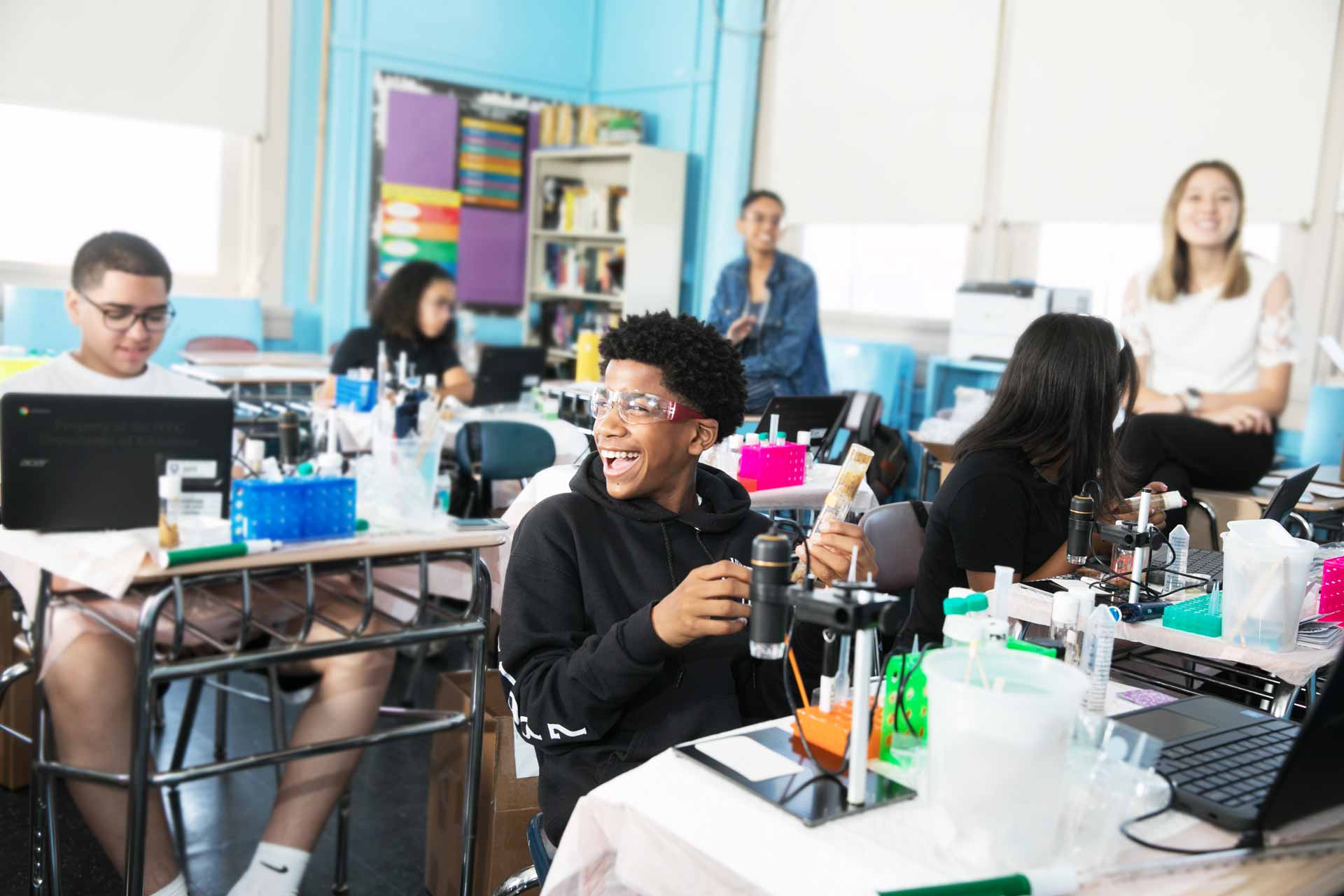The summer kick-off for a group of Bronx high school students involved a lot of bugs and a microscope.
Carlos
“This program got me even more interested in how medicine works and the impact it can have on people and in cancer.”
—Carlos Jose Cedano Llano
Namarachi
“After the program, I realized just how interested I am in cancer research and I’ve started to consider how I could combine cancer research with my interest in neurosurgery as a career.”
—Namarachi Okwuka
Ugochinyere
“My favorite part was doing all the hands-on science! The studies and research we conducted really made me think deeper about food and nutrients and their relation to cancer risk.”
—Ugochinyere Agbaeze
Eliannie
“This gave me a chance to see what it’s really like to take biology lectures and actually do lab research. The experiments were all really fun.”
—Eliannie Ramirez
Improving Diversity in Science and Medicine
Eighteen sophomores and juniors at University Heights High School in the South Bronx spent a week in June studying the impact of diet and nutrition on tumor growth, using Drosophila, better known as the common fruit fly, as their model organism. The new summer program, organized by the Herbert Irving Comprehensive Cancer Center’s (HICCC) Office of Diversity, Equity and Inclusion, Community Outreach and Engagement Office, and Cancer Research Training and Education Coordination Core, provides middle and high school students in Columbia University Irving Medical Center’s neighborhoods with hands-on lab experiments to study cancer. The program gave young students direct exposure to an advanced level of research, science and medicine.
In-person classroom experiments were led through virtual lectures with an educational organization called eCLOSE Institute, together with Columbia faculty, students and staff. Each student worked with a fruit fly science kit provided to them at the start of the week that included microscopes, pipets, mini-balances and other equipment necessary for experiments. The students learned critical lab skills, hypothesis generation, data collection and analysis.
The new program aims to promote and support local, diverse middle- and high school students interested in science and medicine but who may not have the opportunity or resources to gain hands-on scientific research or lab experience. Many of the students ended the program, engaged and energized to learn more about science, cancer research, and medicine.
“Our goal is to increase and improve our pipeline of talented students from the diverse neighborhoods around the medical center and engage students who may be interested in science and medicine at Columbia with our trainees, researchers and faculty members.”
—Sandra Ryeom, PhD
Associate Professor of Surgical Sciences, Vagelos College of Physicians and Surgeons
Associate Director, Diversity, Equity and Inclusion Office, Herbert Irving Comprehensive Cancer Center (HICCC)
Member, Tumor Biology and Microenvironment Program, HICCC
A Summer of Science
New Outreach Program Shapes Future Scientists
The summer kick-off for a group of Bronx high school students involved a lot of bugs and a microscope.

REad story
Improving Diversity in Science and Medicine
“Our goal is to increase and improve our pipeline of talented students from the diverse neighborhoods around the medical center and engage students who may be interested in science and medicine at Columbia with our trainees, researchers and faculty members.”
—Sandra Ryeom, PhD
Associate Professor of Surgical Sciences, Vagelos College of Physicians and Surgeons
Associate Director, Diversity, Equity and Inclusion Office, Herbert Irving Comprehensive Cancer Center (HICCC)
Member, Tumor Biology and Microenvironment Program, HICCC
Eighteen sophomores and juniors at University Heights High School in the South Bronx spent a week in June studying the impact of diet and nutrition on tumor growth, using Drosophila, better known as the common fruit fly, as their model organism. The new summer program, organized by the Herbert Irving Comprehensive Cancer Center’s (HICCC) Office of Diversity, Equity and Inclusion, Community Outreach and Engagement Office, and Cancer Research Training and Education Coordination Core, provides middle and high school students in Columbia University Irving Medical Center’s neighborhoods with hands-on lab experiments to study cancer. The program gave young students direct exposure to an advanced level of research, science and medicine.
In-person classroom experiments were led through virtual lectures with an educational organization called eCLOSE Institute, together with Columbia faculty, students and staff. Each student worked with a fruit fly science kit provided to them at the start of the week that included microscopes, pipets, mini-balances and other equipment necessary for experiments. The students learned critical lab skills, hypothesis generation, data collection and analysis.
The new program aims to promote and support local, diverse middle- and high school students interested in science and medicine but who may not have the opportunity or resources to gain hands-on scientific research or lab experience. Many of the students ended the program, engaged and energized to learn more about science, cancer research, and medicine.
hear what our budding
scientists have to say!
Click the images below to hear what our budding scientists have to say!
“This program got me even more interested in how medicine works and the impact it can have on people and in cancer.”
—Carlos Jose Cedano Llano
“After the program, I realized just how interested I am in cancer research and I’ve started to consider how I could combine cancer research with my interest in neurosurgery as a career.”
—Namarachi Okwuka
“My favorite part was doing all the hands-on science! The studies and research we conducted really made me think deeper about food and nutrients and their relation to cancer risk.”
—Ugochinyere Agbaeze
“This gave me a chance to see what it’s really like to take biology lectures and actually do lab research. The experiments were all really fun.”
—Eliannie Ramirez




